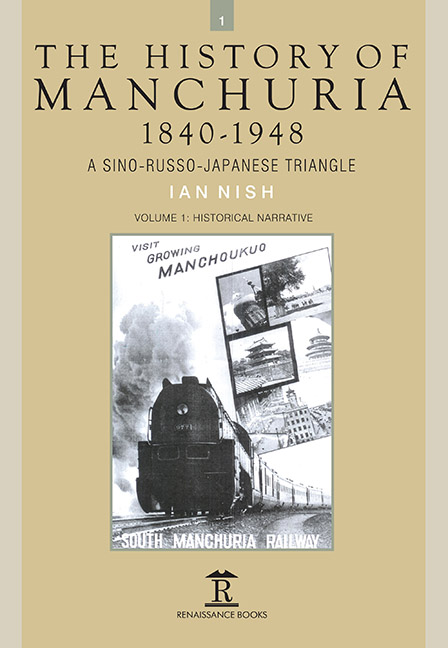Book contents
- Frontmatter
- Dedication
- Contents
- Preface
- Acknowledgements
- Name Conventions
- List of Abbreviations
- List of Maps
- Chapter One Manchuria and Russian Ambition, 1840s–1890s
- Chapter Two Sino-Japanese War and After, 1894–1900
- Chapter Three Prelude to the Russo-Japanese War, 1900–1905
- Chapter Four Railways, Reforms and Revolutions, 1906–1914
- Chapter Five Wartime Turmoil in Manchuria, 1915–1922
- Chapter Six Chang Tso-Lin’s Manchuria, 1922–28
- Chapter Seven Chinese Nationalism and Foreign Railways, 1929–1931
- Chapter Eight Lytton Commission in Manchuria, 1931–1932
- Chapter Nine Manchukuo: From Republic to Empire, 1933–1937
- Chapter Ten A Decade of Wars, 1938–1948
- Epilogue
- Map
- Select Bibliography
- Index
- Volume 2: Select Primary Sources
- Miscellaneous Frontmatter
- Dedication
- Miscellaneous Frontmatter
- Chapter 1 1840–1894
- Chapter 2 1895–1899
- Chapter 3 1900–1905
- Chapter 4 1905–1914
- Chapter 5 1915–1922
- Chapter 6 1922–1928
- Chapter 7 1929–1931
- Chapter 8 1931–1932
- Chapter 9 1933–1937
- Chapter 10 1938–1948
- Apendix Appeal by the Chinese Government
Chapter 9 - 1933–1937
Published online by Cambridge University Press: 18 November 2023
- Frontmatter
- Dedication
- Contents
- Preface
- Acknowledgements
- Name Conventions
- List of Abbreviations
- List of Maps
- Chapter One Manchuria and Russian Ambition, 1840s–1890s
- Chapter Two Sino-Japanese War and After, 1894–1900
- Chapter Three Prelude to the Russo-Japanese War, 1900–1905
- Chapter Four Railways, Reforms and Revolutions, 1906–1914
- Chapter Five Wartime Turmoil in Manchuria, 1915–1922
- Chapter Six Chang Tso-Lin’s Manchuria, 1922–28
- Chapter Seven Chinese Nationalism and Foreign Railways, 1929–1931
- Chapter Eight Lytton Commission in Manchuria, 1931–1932
- Chapter Nine Manchukuo: From Republic to Empire, 1933–1937
- Chapter Ten A Decade of Wars, 1938–1948
- Epilogue
- Map
- Select Bibliography
- Index
- Volume 2: Select Primary Sources
- Miscellaneous Frontmatter
- Dedication
- Miscellaneous Frontmatter
- Chapter 1 1840–1894
- Chapter 2 1895–1899
- Chapter 3 1900–1905
- Chapter 4 1905–1914
- Chapter 5 1915–1922
- Chapter 6 1922–1928
- Chapter 7 1929–1931
- Chapter 8 1931–1932
- Chapter 9 1933–1937
- Chapter 10 1938–1948
- Apendix Appeal by the Chinese Government
Summary
POLITICAL DEVELOPMENT
Stabilization of Manchou Empire
THE EMERGENCE OF Manchoukuo and the declaration of her independence from China ushered in a new era in Manchuria and the Far East. In the midst of skeptical but scrutinizing international observance, the new State undertook a gigantic task of national reconstruction and its achievements during the first eight years of statehood have been nothing short of a marvel. In many respects, it has successfully carried out reforms which were believed to be practically impossible under the former military regime, and the epochal progress widens its horizon and deepens its penetration as the first five-year plan was successfully concluded and the second five-year plan was auspiciously inaugurated in 1937.
The backbone of this marvellous achievement is without doubt the successful execution of political reconstruction, the building of a modern State on the ruins of feudalistic war-lordism. Most significant in this sense was the official transition from Manchoukuo to Manchoutikuo or the Manchou Empire on March 1, 1934, when His Excellency Chief Executive Pu Yi was enthroned as Emperor Kangte. It may be recalled that Manchuria is the home of the Manchous, whence they sprang, and that Emperor Kangte is the last of the Manchou Dynasty, who ascended China’s dragon throne as a child but who was deposed when the revolution resulted in the establishment of the Republic of China in 1911.
Under the Organic Law of the Manchou Empire of 1934 (For the text see Fourth Report, Appendix No. 18), the State is completely centralized in the Throne. The Emperor represents the State; supervises the sovereign rights and exercises them in accordance with the Organic Law; issues or causes to be issued ordinances for the maintenance of public peace and order and for the execution of laws; possesses the power to declare war, to make peace, and to conclude treaties; enjoys the supreme command of the army, navy, and air forces; and has the power to grant amnesty, special pardon, commutation of punishment, and restoration of civil rights.
- Type
- Chapter
- Information
- The History of Manchuria, 1840-1948A Sino-Russo-Japanese Triangle, pp. 116 - 125Publisher: Amsterdam University PressPrint publication year: 2016

